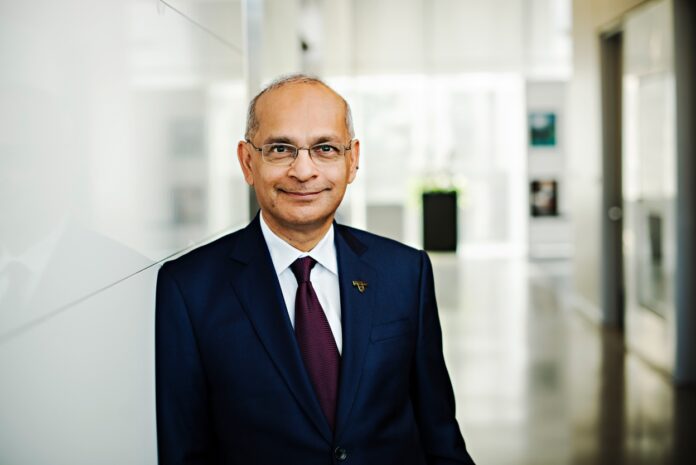Vivek Goel, president and vice-chancellor of the University of Waterloo, recently held a President’s Forum to discuss how the university will adapt and change its approach to education in a post-pandemic world.
Over 900 people attended the virtual event, which featured Goel alongside a panel of UW’s senior leaders. The conference focused on several topics, including hybrid course models and new approaches to teaching based on lessons learned during the pandemic.
“As we start to come out the other side of this pandemic, Canada and the global community are looking at how we build back our economies and societies in a post-pandemic world. The learners we are educating today will play an important role in shaping this global post-pandemic recovery,” Goel said.
Panelists included Jeff Casello, associate vice-president, graduate studies and postdoctoral affairs; David DeVidi, associate vice-president, academic; and Norah McRae, associate provost, co-operative and experiential education.
The forum began with DeVidi speaking about the first theme of the strategic plan: developing talent for a complex future.
“What society and our students need now will be different 10 years from today. We need to take action right now so that 10 years from now, we’re the university that we need to be,” DeVidi said.
He spoke of several projects that are currently underway in this area. DeVidi and his team are developing pilot projects for new styles of courses, such as cross-faculty interdisciplinary courses and student-led courses. Hybrid models such as the blended learning initiative, which integrates online and in-person content, will also continue to be explored post-pandemic.
“At the individual instructor level, a lot of them have learned the value of pre-packaged asynchronous materials, both for them and their students,” DeVidi said. “[We are] available to try to transform more of these remote courses into an increased stock of fully online courses going forward. For the people who really liked what was happening during the pandemic, I think they’ll find that the future of the University of Waterloo is more to their liking.”
McRae then spoke about the impacts of the pandemic on co-op students. She highlighted ongoing efforts from the co-op department, including data analytics for employer engagement and the WE Accelerate program that helps first-year students gain experience. She also emphasized the importance of experiential learning to help build new skills in an ever-changing world of work.
“The World Economic Forum identified five key trends for the future of work: work from anywhere, work for all, work at will, work smarter and work for the planet,” McRae said. “So when I think of those five categories, then, it behooves us to ensure that our students are able to work in those ways…We also employed data analytics to understand the needs of employers, so we were learning how to work smarter and really moving that into program development. So I think we have to train our students and help our students be able to work successfully under those conditions for the future.”
DeVidi spoke about plans for an incubator space for faculty members that would support the development of novel ideas related to education.
“In the incubator, you can provide the supports that are needed to actually try out that idea — develop it, test drive it, validate it — and then the university can make a decision about it; is this something we want to roll out more broadly? It can be anything from a new way of teaching in a classroom, like a new way of using virtual reality for teaching biology classes, to interdisciplinary courses. Or it could be something structural — what’s next for life-long learning?”
DeVidi also discussed a survey that gathered the opinions of students and faculty about learning spaces on campus. He explained that the university will be updating a few classrooms per year to improve the spaces and provide more opportunities for interaction and collaboration.
“If you’re going to come up with new ways of teaching and learning, new strategies for working effectively in the classroom, it probably isn’t great if the vast majority of your classrooms have tables and chairs that are bolted into the floor. Every year, we look at a couple learning spaces that were identified as among Waterloo’s most problematic. We’re redesigning those and making them into flexible, active learning spaces that give instructors the option to teach in different kinds of ways.”
The forum then moved to an operational update from James Rush, vice-president academic and provost.
Rush provided data on student activity for the fall 2021 term. There were 16,821 students taking part in at least one on-campus activity – roughly half of the usual amount. The Physical Activities Complex and Columbia Icefield (CIF) saw over 9,000 check-ins in the first week of the term, and over the month of September, there were 50,000 participants. Even with the increased number of students, university operations have been running smoothly.
As previously announced, the winter 2022 semester will return to pre-pandemic levels of in-person instruction. Rush stated that next steps for the leadership team include campus planning for the winter semester, reviews of the current restrictions on international travel for students and researchers, and adding employee and manager supports for post-pandemic operations.
“Based on the latest projections, I think we are in a very good place here in the Waterloo region and province of Ontario,” Goel said. “As long as we and our community continue to maintain vigilance, I think we can continue to achieve the goals we have outlined.”































